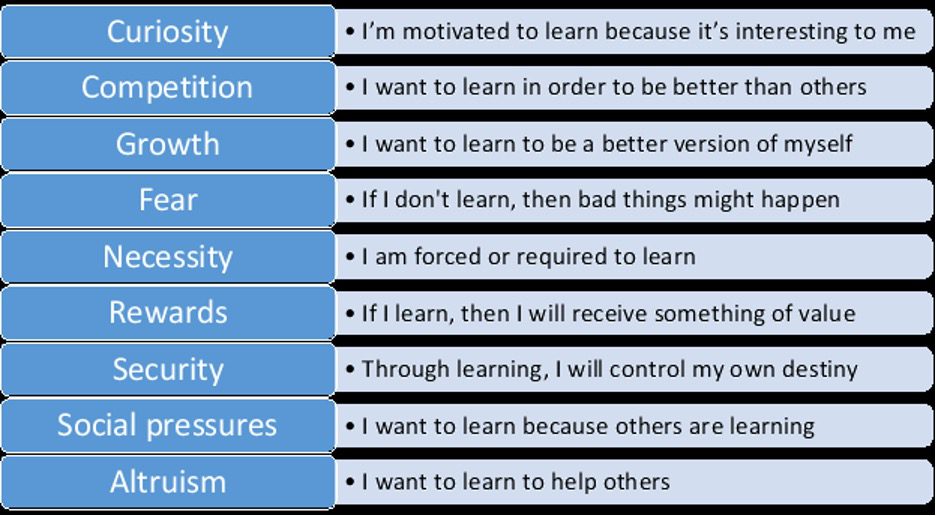 The world is too complex and too large for anyone to understand all its wonders. But if we are willing to settle for a full appreciation of the many things we do know and the many more things we do not know, then there is but one path to take – that of lifelong learning. For those who work within an organization, the promise of lifelong learning is more focused, but no less alluring. It offers each individual the ability to be, and continue to be, their best and most enlightened selves as contributors to the organization. In turn, it offers the organization — a reflection of its people — the ability to be, and continue to be, the best and most enlightened version of itself as an organization.
The world is too complex and too large for anyone to understand all its wonders. But if we are willing to settle for a full appreciation of the many things we do know and the many more things we do not know, then there is but one path to take – that of lifelong learning. For those who work within an organization, the promise of lifelong learning is more focused, but no less alluring. It offers each individual the ability to be, and continue to be, their best and most enlightened selves as contributors to the organization. In turn, it offers the organization — a reflection of its people — the ability to be, and continue to be, the best and most enlightened version of itself as an organization.
None of this should be a mystery, at least for the many people and organizations that already have discovered the power of lifelong learning. It’s why, at my own company, our top value is — you guessed it — lifelong learning, and why the core of our strategic plan is elevating our people.
The great mystery is how an organization can establish a perpetual state of lifelong learning. What are the key conditions necessary to foster the kind of enlightened workforce that makes an organization enlightened? While the precise answer to that question is multifaceted, the main conditions are motivation, unlearning, humility and stability.
 Motivation
MotivationMotivation to learn can come in many forms, but without a constant supply of it, organizationally pervasive lifelong learning cannot occur. In this context, the most common sources of motivation are rooted in our individual psychologies, and they include:
 An organization that wants to facilitate lifelong learning should be ready to utilize any of these sources, depending on the nature of its workforce and its individual members. The reality, however, is that a combination of all these sources is probably necessary to achieve maximum penetration within an organization, if only because some people react better than others to certain stimuli.
An organization that wants to facilitate lifelong learning should be ready to utilize any of these sources, depending on the nature of its workforce and its individual members. The reality, however, is that a combination of all these sources is probably necessary to achieve maximum penetration within an organization, if only because some people react better than others to certain stimuli.
Here is a sampling of techniques for offering the above forms of motivation:
 Unlearning
UnlearningWhen a child learns something for the first time, their learning process may be facilitated by the fact that the subject is completely new. Especially when they are younger, they are what we might call a “tabula rasa.” With adults, however, learning is often predicated on our ability to unlearn ideas of the past that are no longer valid or applicable. For this reason, an organization that seeks to sustain lifelong learning must foster a culture that enables the free flow of new ideas, completely unhindered by the status quo.
If you’re a fan of Star Wars, you may remember when Yoda admonishes his student, Luke Skywalker: “You must unlearn what you have learned.” That’s because for Luke to learn anything new, he must first release the convictions to which he long adhered.
At my company, we make a cultural commitment to “explore the opposite” of what we may be thinking and never assume that we have all the answers. I’m mindful of the fictional (but still scary) Professor Kingsfield from the movie The Paper Chase, when he said:
“At times you may think you have reached the correct answer. I assure you that is simply a delusion on your part. You will never find the ultimate, correct and final answer. In my classroom there is always another question—there is always a question to follow your answer.”
This kind of free and continuous thinking can only occur when we are willing to release our past learnings. The better we are at unlearning, the greater the opportunity for learning.
You can even think of our prior learnings as a type of “blockage” that must be removed (through unlearning) to facilitate lifelong learning. Another type of blockage is harder to remove. I’m talking about pride—our certainty that we are right because, well, we just know we are.
Organizations that create optimal learning environments celebrate attempts to be successful almost as much as they do success itself; and they also celebrate being comfortable not knowing all the answers. They channel the sentiment of Albert Einstein when he said that “a true genius admits that they know nothing!”
They also emphasize team efforts and results over individual efforts and results. Sure, they attend to individual accountability, but they recognize pride and individual bravado as impediments to learning. At my company, we talk about “super teams before super stars.” We know that we have people who others would call “super stars,” and we’re grateful to have them. But we’re mainly grateful to have them because, as strong as they are individually, they know they are strongest when working with others.
By emphasizing honest efforts as much as results, comfort with not knowing everything, and teams over individuals, an organization can encourage just enough humility to stimulate ongoing learning. Almost everyone struggles with humility, but we are freer to learn when learning is the objective – not self-aggrandizement.
If lifelong learning is an engine of progress, then motivation is the fuel, and unlearning and humility are the grease and oil. But an engine can only work if it’s structurally sound. Everything must work well, and the slightest failure of a valve, gasket, shaft, or piston can shut the whole thing down. And that’s how it is with organizations trying to stimulate lifelong learning. Quite simply, people cannot remain focused on lifelong learning if they are not offered stable conditions in a stable organization.
Don’t get me wrong. No organization is perfect, and everyone worries at least a little about job security. It’s just that there is a direct correlation between organizational and job stability on the one hand and optimal base conditions for learning on the other.
Want your organization to foster lifelong learning? You should, assuming you want the company and its employees to be at their very best for many years to come. It all starts with motivation, unlearning, humility and stability — though I’m open to a lifetime of learning that suggests otherwise!

Chief Executive Group exists to improve the performance of U.S. CEOs, senior executives and public-company directors, helping you grow your companies, build your communities and strengthen society. Learn more at chiefexecutivegroup.com.
0

1:00 - 5:00 pm
Over 70% of Executives Surveyed Agree: Many Strategic Planning Efforts Lack Systematic Approach Tips for Enhancing Your Strategic Planning Process
Executives expressed frustration with their current strategic planning process. Issues include:
Steve Rutan and Denise Harrison have put together an afternoon workshop that will provide the tools you need to address these concerns. They have worked with hundreds of executives to develop a systematic approach that will enable your team to make better decisions during strategic planning. Steve and Denise will walk you through exercises for prioritizing your lists and steps that will reset and reinvigorate your process. This will be a hands-on workshop that will enable you to think about your business as you use the tools that are being presented. If you are ready for a Strategic Planning tune-up, select this workshop in your registration form. The additional fee of $695 will be added to your total.

2:00 - 5:00 pm
Female leaders face the same issues all leaders do, but they often face additional challenges too. In this peer session, we will facilitate a discussion of best practices and how to overcome common barriers to help women leaders be more effective within and outside their organizations.
Limited space available.

10:30 - 5:00 pm
General’s Retreat at Hermitage Golf Course
Sponsored by UBS
General’s Retreat, built in 1986 with architect Gary Roger Baird, has been voted the “Best Golf Course in Nashville” and is a “must play” when visiting the Nashville, Tennessee area. With the beautiful setting along the Cumberland River, golfers of all capabilities will thoroughly enjoy the golf, scenery and hospitality.
The golf outing fee includes transportation to and from the hotel, greens/cart fees, use of practice facilities, and boxed lunch. The bus will leave the hotel at 10:30 am for a noon shotgun start and return to the hotel after the cocktail reception following the completion of the round.